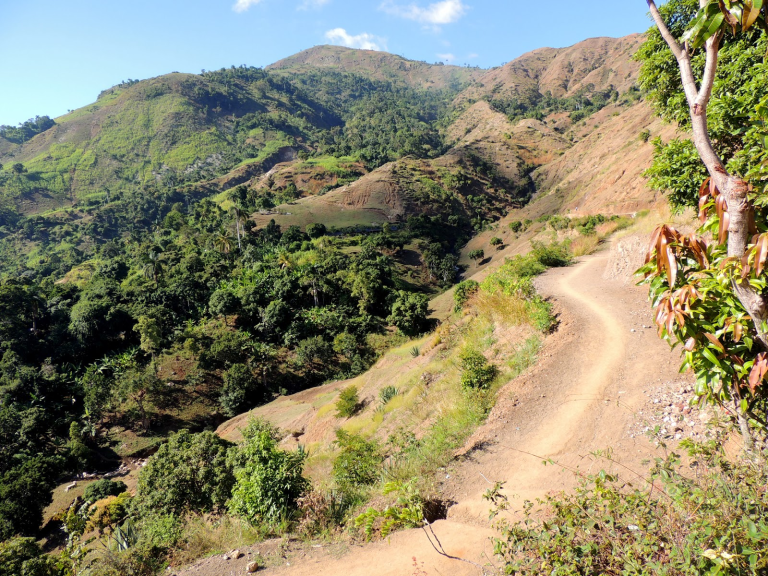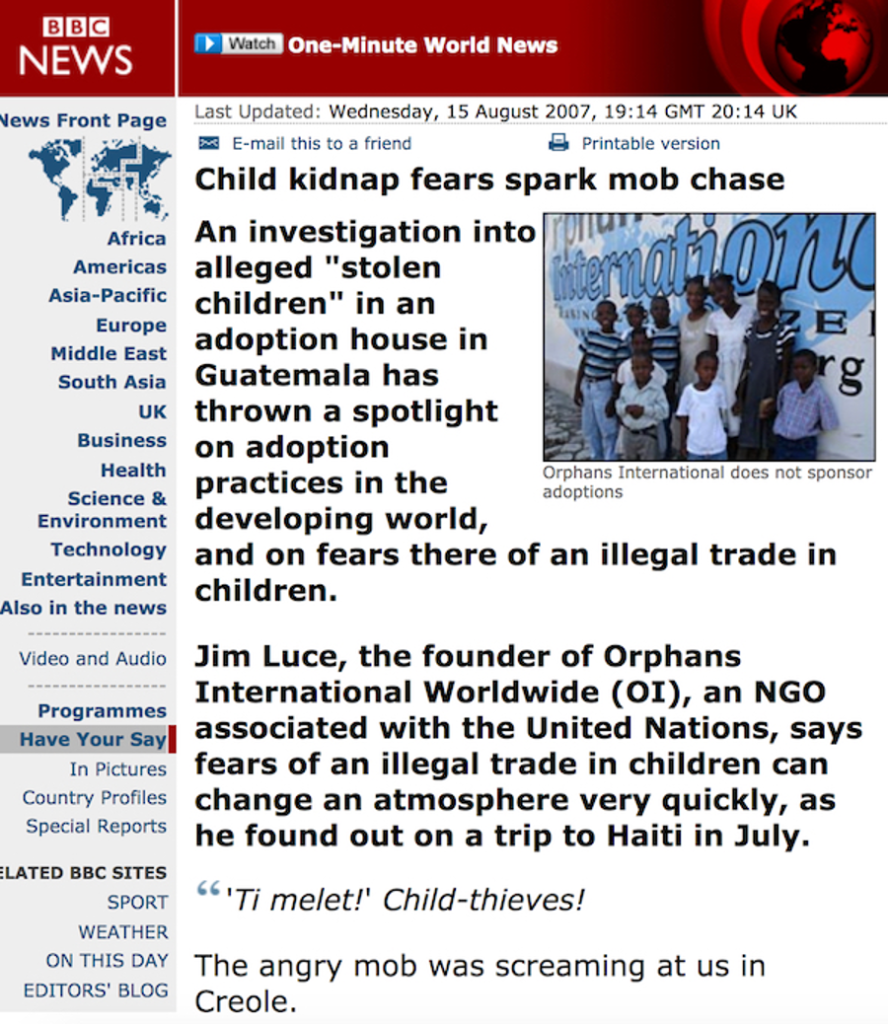
Chased up the mountain
An investigation into alleged “stolen children” in an adoption house Guatemala has thrown a spotlight on adoption practices in the developing world, and on fears there of an illegal trade in children. Jim Luce, the founder of Orphans International Worldwide (OIW), an NGO associated with the United Nations, says fears of an illegal trade in children can change an atmosphere very quickly, as he found out on a trip to Haiti in July.


Port-au-Prince. The angry mob was screaming at us in Creole. Even though I didn’t know at the time what the words meant, I knew we were all in grave danger – three small children from our orphanage and us three adults.
This was my 16th trip to Haiti and I had never experienced anything like it. With a new government in place, Haiti was doing better than we had ever experienced. Local friends had assured us the political and economic violence was over. Jim Luce believes adoptions fuel fears of corrupt practices.
With me were OI Haiti director Jacques Africot, a child psychologist from New York, Dr. Doris Chernik, and the three youngest kids from our orphanage in the dusty city of Gonäives – four-year-old Patrick, plus Walter and Jean Kerby, both five.
We’d taken them wading in a local river in the cool green of the mountainous countryside. It had been a great day out up to then. But things turned for the worse when we stopped to fill the SUV up with fuel.

It was hot in the back of the car, so we let the kids out. We sat on the curb, waiting for the jeep to be serviced.Some local villagers started to gather around us, curious to see these beautiful children who were smiling and happily clapping their hands together.T hen the villagers began to question our kids. The villagers’ mood shifted. Suddenly they seemed less friendly. Our kids stopped smiling and fidgeted nervously .A man stomped over to me and began to scream at me in Creole – a language I don’t understand.Face-off
The crowd didn’t believe Jacques when he tried to explain to the crowd in Creole that he was the project director of an orphanage helping Haiti’s children. They dismissed him as merely a driver for the rich whites. Suddenly little Jean Kerby was screaming, high pitched and frantic, as the crowd began to yank him from our car.
The growing crowd began to chant louder and louder in the local village dialect, ‘Ti melet!’. I learned the meaning later – ‘child-thieves.In seconds, the crowd had grown from 10 to 50. The villagers, now shouting louder, started banging on the car.We put the car in reverse, but couldn’t move it – our rear wheels had been blocked with boulders.
Jacques, calm and in control, shouted that he was going on foot for the police.Suddenly little Jean Kerby was screaming, high pitched and frantic, as the crowd began to yank him from our car. I held on to his feet and, as the adrenaline kicked in, pulled him back, winning this human tug of war.

To the Rescue
The back door opened again.It was Jacques, who – amazingly – had managed to find a policeman in the local restaurant.The gigantic policeman clambered into the front seat. A man was about to heave a cement block through our front window and another one raised a block to our left side.The policeman jumped out and screamed he was taking us to the local police station.
They backed off a bit.In haste, the officer drove a mile down the road and then stopped. He now seemed as frightened as we were, but he needed to get some facts.As soon as we stopped, new people began to gather around us. I was worried, but the big policeman in the driver’s seat ignored them. Doris and Jacques kept explaining who we were, and the policeman seemed satisfied.We now understood for the first time the angry crowd thought we were kidnapping their children for the international black market.
Suddenly, people in the crowd lifted up cinder blocks ready to throw them through our windows.The policeman pulled out his gun and aimed it squarely at the lead block-thrower’s chest and with his booming voice screamed something – perhaps “Back off or you die!”It worked.
Lying in Wait
The officer sped us to the village square with its sleepy police station. But dozens of people chased us.Tyres squealing, gravel flying, the policeman raced our jeep around the village square.He was shouting out of the window to friends on their porches to use their cell phones to call for reinforcements: ‘Now!’
He then made the critical decision to head up the mountain, on a narrow, zigzag road, to the next police station 14 miles (22km) away, up in the village of Marmalade. Our reinforcement was waiting at the foot of the mountain road, the police officer’s civilian brother riding the officer’s police motorcycle, and now serving as our escort.Up the hill we sped, bouncing off the huge pot-holes. All I could feel was the sense of impending death.
With our car, we can out-race mobs, but with cellular technology, the villagers could dial their friends and family all the way up the mountain.Many groups were lying in wait to attack us.At the first market, dozens of angry Haitians stood ready to block the road and burn our car.The policeman, like Bruce Willis in an action movie, hung out of the car window, pointing his weapon at the angry crowds who then backed away as we raced by.
Jacques sat in the back seat, little Jean Kerby balanced on his lap, calling on his cell phone, trying desperately to reach the Haitian national police, and the UN police, both in Gonäives – now an hour away – as well as the American ambassador and the UN peacekeepers in Port-au-Prince, six hours away. The policeman was also on his cell.Then, our hero cop received word that the police at the top of the mountain could not come to our assistance as their only car was broken.
We were on our own.Death by lynch mob?For more than an hour, all I could feel was the sense of impending death.But we kept trying to be cheerful with the kids, telling them how brave they were not to cry.Suddenly, the road was blocked as we had feared. We braked to a stop. Office tables lay across the street, with construction debris piled behind them.
Two enraged women pointed at me, accusing me of trying to kidnap one of their sons.
An angry official demanded to know why the policeman was assisting the kidnappers.I later learned that he was the village mayor, and the policeman had told him our lives were in severe danger and to move out of the way: ‘Now!’The tables were moved aside and our policeman angrily drove us over the piles of debris.Six blocks later we screeched to a stop in front of the mountain-top police station where eight policemen had gathered to protect us. But they also had to fill in some official paperwork on us. A new mob gathered outside the gates, including some familiar faces from the gas station far below. And soon the media arrived.Satisfied with our story, the police chief called the national police and the UN police in Gonäives for reinforcements.
Facing the Accusers
The ringleaders of the gas station riot were brought in to be questioned in front of us.Two enraged women pointed at me, accusing me of trying to kidnap one of their sons as he was swimming, the day before.So that is how it all started.Or had they just invented the story?

Haitian police made supreme efforts to protect the OI group.
The police quickly determined that one of the women had only heard that ‘two whites’, whom she had never seen, had tried to kidnap her child. Nor had she reported the alleged kidnapping to the police.Luckily, we had a receipt showing that we had hosted a party for our children at Doris’s hotel, 60 miles (96km) away.
The police scoffed at the women’s story and then scolded them in Creole, apparently ridiculing them for coming very close to getting international development workers killed.Some six hours later, another police car arrived and – with the police riding shotgun in case of ambush – we drove down the mountain.Police from Gonäives and the U.N. met us at the bottom, and they took us back to safety.Sitting at the breakfast table the next morning in Gonäives, I realized I’d saved other people’s lives before, but this was the first time my own life had been saved.
Post script: One week later, Jim found out that his “Bruce Willis” police officer hero, Florestal Olondieu, had been shot and killed in an unrelated incident. Undaunted, Jim has since visited Haiti 27 times, and had close brushed with death twice more in a collision and a house fire.
Originally published by the BBC, August 15, 2007. Edited by Ethel Grodzins Romm.